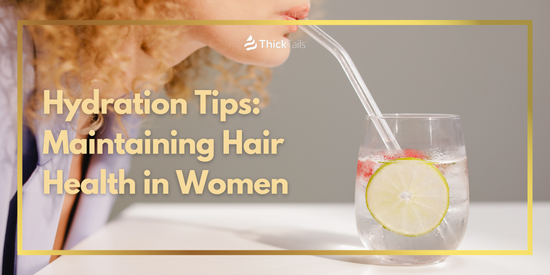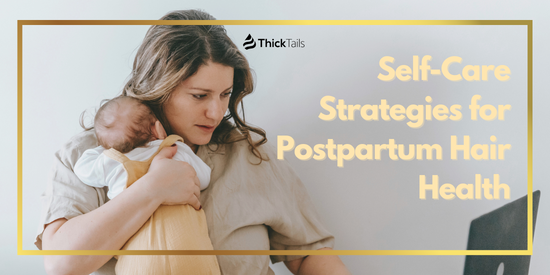For women, hair isn't simply a setting or an accessory – it’s an expression of identity, cultural context, and, more often than not, emotional well-being. When it comes to hair health, the conversation often revolves around external factors such as environmental stress, heat styling, or chemical treatments. However, there exists an intricate mosaic between our mental health and hair vitality that we often overlook. This blog post takes a deep, empathetic look at the profound link between mental health and women's hair, offering a narrative that goes beyond the usual tips and tricks.
The Invisible Thread: Mental Health and the Hair-Brain Connection

Mental health is a recurring theme in our lives, with fluctuations often causing tangible impacts on our physical health. In this chapter, we will peel back the layers of this intriguing connection.
The Impact of Stress and Anxiety on Hair Health
It’s no secret that high-stress levels can lead to shedding – not just tears but hair, too. The field of psychodermatology studies the interaction between emotional health and skin, nails, and hair, shedding light on how increased cortisol levels can cause hair to prematurely enter the telogen (resting) phase, leading to diffuse shedding over several months. Stressors don’t discriminate; they can be as varied as a traumatic life event, a challenging work scenario, or sustained daily pressures.
How Mental Health Conditions Can Influence Hair Loss
Depression, anxiety, and other mental health conditions are often treated as stand-alone ailments, yet the implications can reverberate. Medication side effects, nutritional deficiencies from poor appetite or absorption, and the physical manifestation of emotional distress (such as trichotillomania, a hair-pulling disorder) all contribute to disruptions in the hair growth cycle. We will explore these connections with sensitivity and practical advice.
The Science Behind the Hair-Brain Connection
From neurological pathways to hormonal imbalances, the scientific community has been exploring how the brain and hair follicles communicate. We will unravel the role of neurotransmitters, such as neuropeptides, which can influence hair cycle phases, and the emerging field of psycho-neuro-endocrinology that examines the complex interplay of emotions, the nervous system, and hormonal responses that impact our mane.
Mental Well-being and Hair Vitality: A Symbiotic Relationship
The barrage of daily stresses doesn’t seem to be letting up, so what can we do about it? This section offers practical tips and strategies to elevate both your mental state and the health of your hair.
Incorporating hair supplements into your diet can offer dual benefits for mental health and combating hair loss. These supplements, rich in vitamins and minerals essential for brain function and hair follicle health, can bridge the gap in nutritional deficiencies often seen in those experiencing stress and anxiety. It's a holistic approach, emphasizing that nourishing the body can, in turn, support mental well-being and hair vitality.
Stress Management Techniques: Meditation, Yoga, and Mindfulness
For centuries, Eastern practices like meditation, yoga, and mindfulness have been touted for their benefits to mental clarity and stress reduction. Modern science has validated these techniques, showing that they can lower cortisol levels and potentially mitigate their effects on hair loss.
Healthy Habits for Better Mental and Hair Health: Diet, Exercise, and Sleep
Lifestyle factors play a pivotal role in our overall well-being. In this chapter, we will explore the trifecta of a balanced diet, regular exercise, and quality sleep as foundational pillars for mental resilience and hair strength. We will also discuss how specific nutrients, like omega-3 fatty acids and vitamin D, promote both psychological health and robust locks.
Seeking Support: Therapy, Counseling, and Community Resources
There is no shame in reaching out for help, yet many women hesitate. We will dismantle this stigma and traverse the landscape of therapeutic support, from traditional counseling to community resources and virtual platforms that foster connection and understanding.
Nourishing Your Hair Inside and Out: The Self-Care Executive Order

Self-care is a buzzword that has transcended cliché to become a necessity – and one that is particularly relevant when it comes to maintaining the health of our hair. This section will provide a portfolio of practices to feed both the physical and emotional roots of our being.
Incorporating the right shampoo and conditioner into your daily routine can work wonders, especially when they're infused with nutrients that fortify hair from the roots. Similarly, integrating hair supplements rich in biotin, zinc, and vitamins can provide the internal support needed to counteract the effects of mental health challenges on hair loss. This holistic approach underscores the symbiosis between nurturing our mental well-being and adopting targeted hair care practices.
Nutritional Support: Vitamins, Minerals, and Supplements for Hair Health
A nutrient-rich diet is a potent form of self-care, yet sometimes supplements are necessary to bridge the gap. We will spotlight key vitamins, minerals, and herbal supplements that have proven efficacy in promoting hair growth and fighting the implications of poor mental health on our tresses.
In addition to external treatments, it's essential to understand that mental wellness can significantly impact the effectiveness of hair care regimens. Combining therapeutic approaches for mental health with the right shampoo and conditioner, as well as hair supplements, can create a comprehensive strategy against hair loss. This multifaceted approach reinforces the importance of addressing both the psychological and physical aspects of hair care.
Gentle Hair Care Practices: Choosing the Right Products and Avoiding Damage
From finding the ideal shampoo and conditioner to understanding the effects of heat styling, we will explore how to create a hair care regimen that not only respects your strands but also provides a moment of calm in your otherwise hectic day.
Choosing the right shampoo and conditioner, alongside adding specific hair supplements to your regimen, can act as a powerful tandem in combating the negative impact of mental health issues on hair loss. It’s an acknowledgment that while we address underlying psychological stressors, providing direct nourishment to our hair is equally vital. This dual approach underscores the intricate link between mental wellness and the health of our hair, reinforcing the concept that treating one can beneficially influence the other.
Self-Care Rituals: Scalp Massages, Hair Masks, and Relaxation Techniques
Self-care rituals are a beacon of hope, signaling that you are worth the investment of time and attention. We will divulge the techniques of scalp massage, the nurturing properties of hair masks, and the arts of relaxation that can subdue your worries while enlivening your locks.
In the intertwined realms of mental health and hair care, the selection of shampoo and conditioner, as well as the incorporation of hair supplements, are more than just steps in a routine; they are profound gestures of self-compassion and healing. Recognizing the role of mental health in hair loss compels us to adopt a holistic view, where nurturing our minds and choosing the right hair care products go hand in hand in fostering both psychological well-being and the vitality of our tresses.
In conclusion, this comprehensive review of the hair-brain connection for women's mental health and hair vitality is designed to be empathetic, informative, and action-oriented. By recognizing the deep interplay between our emotions and our hair, we can foster an approach that is not only more effective but also nurturing to the core. It is my hope that these insights will spark a conscious dialogue within our community, one that encourages each of us to grow not just hair, but compassion and resilience, from the inside out. Whether you are experiencing a complex case of hair loss during menopause or dealing with general hair health issues, remember that you are not alone, and there is a wealth of supportive practices and resources available to you.







